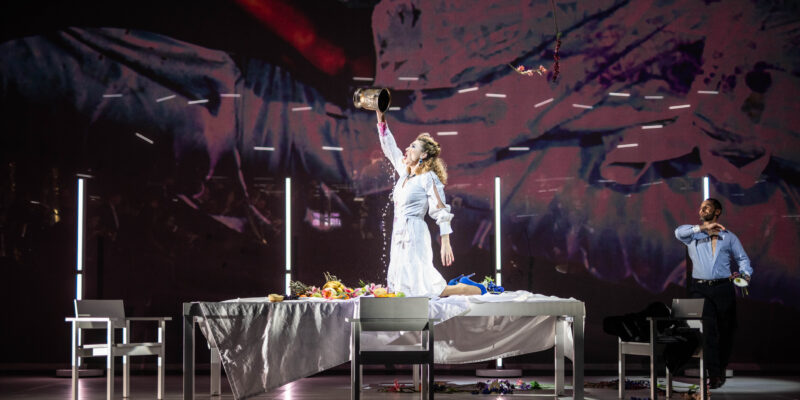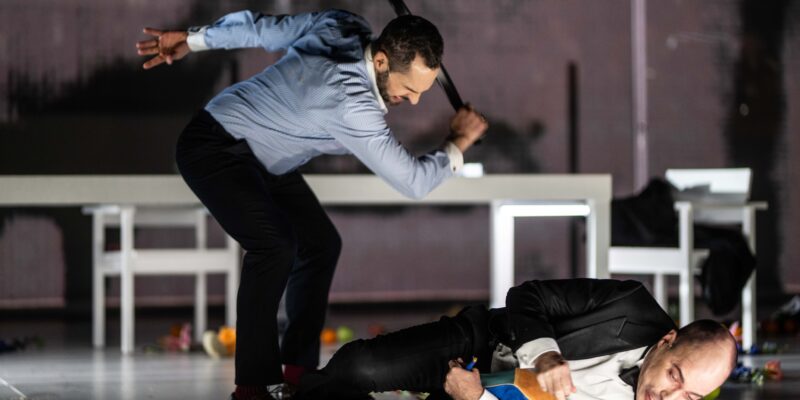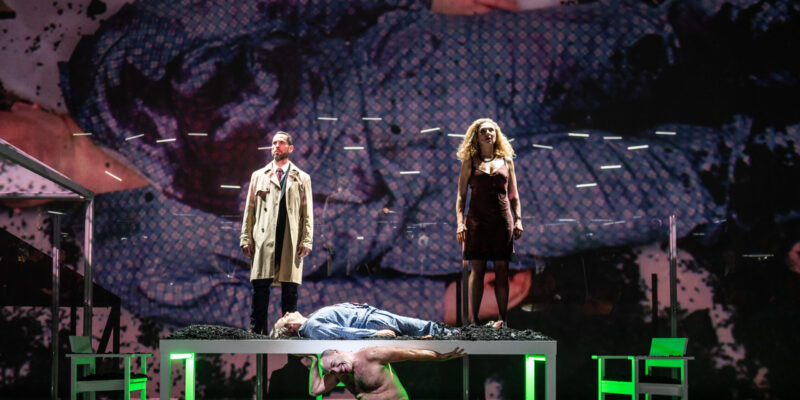Die ersten Menschen is een opera in twee bedrijven van Rudi Stephan. Als libretto koos hij het gelijknamige toneelstuk van Otto Borngräber, dat laatstgenoemde omschreef als een “erotisches Mysterium”. Het werk ging in première op 1 juli 1920 in Frankfurt am Main, bijna vijf jaar na de dood van de componist.
You can have any review automatically translated. Just click on the Translate button,
which you can find in the Google bar above this article.
Adahm: Kyle Ketelsen; Kajin: Leigh Melrose; Chawa: Annette Dasch; Chabel: John Osborn; Orkest: Koninklijk Concertgebouworkest; Muzikale leiding: François-Xavier Roth; Regie Calixto Bieito
Muziek: 5*****
Regie: 2**
Die ersten Menschen
“vóór den uchtend van hun bloei vergaan…”
In 2021 stond er in het Muziektheater een productie van La Damnationa de Faust gepland, een alleraardigste opera met veel koor, vol emotionele expressie en, virtuoze passages; duurt zo’n ruime 2 uur, goed te doen, in tegenstelling tot Les Troyens, een opera die ruim 3 uur in beslag neemt. Berlioz is sowieso al een risico voor een teer gestel, maar Les Troyens is een bezoeking. Prachtig hoor, die grote contrasten in tempo, dynamiek en instrumentatie, die wisseling tussen statige, heroïsche passages en intieme, lyrische momenten, die dynamische spanning en emotionele impact… maar kan het niet wat bondiger?
In 2021 kon die Damnation helaas niet door kon gaan vanwege corona, dus ging men op zoek naar een coronabestendige reserve-opera. Gevonden! Die ersten Menschen: slechts 4 solisten en geen koor, volkomen corona-bestendig. Nu, 4 jaar later, wordt Die ersten Menschen hernomen en dat werpt meteen een essentiële vraag op: waarom eigenlijk? Wij blijven u het antwoord schuldig. Contractuele verplichtingen wellicht, of een gebaar naar Mensen van Nu om weer eens met regisseur Calixto “toch-heb-ik-mooie-producties-van-hem-gezien” Bieto op het affiche te pronken? Als wij het voor het zeggen hadden (Volksleger der DNO-volgers: bewapent u!): wij hadden gekozen voor een van de weinige (zeer) geslaagde DNO-producties, namelijk Königskinder. Maar ja, het publiek smachtte naar Die ersten Menschen. “Die opera moet ik beslist nog een keer zien”, sidderde het door het land. En als er één instantie is die er voortdurend in slaagt om het iederéén naar de zin te maken, dan is het DNO wel. Herinnert u zich de volksfeesten op straten en pleinen nog na de première van Fidelio? De huis-aan-huis verkopers van sneeuwbolletjes met het portret van Beethoven deden goede zaken!

Die ersten Menschen
Componist Rudi Stephan putte voor zijn libretto uit een toneelstuk van Otto Borngräber (ook wel: Borngreber), Die ersten Menschen. Erotisches Mysterium in zwei Akten. Het behandelt de oorsprong van de mensheid, de vroegste vormen van menselijke interactie in een mystieke context. Borngräber verwerkt elementen van filosofie, mythologie en erotiek om te reflecteren op de oermenselijke ervaringen van verlangen, seksualiteit en spiritualiteit. Een klusje dat hij zich niet graag liet ontnemen.
Disfunctioneel gezin
In de opera wordt de oerversie van Het Gezinnetje gepresenteerd, een soort Addams Family redux, bestaande uit Adahm (Kyle Ketelsen), Kajin (Leigh Melrose), Chawa (Annette Dasch) en Chabel (John Osborn). De bijbelvasten onder ons herkennen Adam, Eva, en de gebroeders Kaïn en Abel. Het is een rommeltje in huize Adam-Eva. Chawa zit maar een beetje te dagdromen: wat was haar nu afgeleefde echtgenoot Adahm vroeger toch een lekker ding! Meid, hou op! Adahm is agrariër (?) en werkt zich het leplazarus: ja, weinig tijd voor vrouw en kinderen, dat weten we nu wel, maar wie brengt er anders brood op de plank? Ook haar zoontjes waren vroeger schatjes. Vroeger! Nu is Kajin is een sexual predator, op zoek naar de ultieme buit, die hij nooit zal vinden (Jennifer Lawrence was nog nergens te bekennen). Chabel is een heel eng kereltje. Hij wordt geteisterd door delieren over God c.s. en heeft een incestueus gedachtenleven vol begeerte naar het brandende braambos van Mevrouw Zijn Moeder. Daarvoor is hij bij zijn moeder, Chawa, precies aan het goede adres. (Een ander adres is er trouwens niet.) Daar voelt Kajin zich dan weer onveilig bij, en hij slaat zijn broer de hersens in. Get it over and done with! Het is ook lastig: hoe verwekken 3 mannen en 1 vrouw een mondiaal nageslacht? Het onontkoombare en reeds gegeven antwoord is: via inteelt. Jules de Corte, Beethoven, het Kindeke Jezus, Koningin Juliana, The Elephant Man, Peter Konwitschny… zij allen zijn, net als u en ik, producten van inteelt. Het verklaart veel.

Bij DNO verplaatst de regisseur het gezinnetje (o wonder) naar onze tijd. We krijgen een verzameling Tokkies voorgeschoteld (wat zijn Tokkies? klik HIER ) waarin Kajin de outcast is. Muzikaal maakt hij, de bad guy, zijn opwachting met zachte, dreigende paukenslagen, terwijl Chabel, de good guy, wordt geïntroduceerd met liefllijke strijkersklanken. Er is een hoop herrie in de tent, en aan het eind van deze “versie” zijn de broers verder van elkaar verwijderd dan ooit, wat in flagrante tegenstelling is met het libretto dat hoopvol (partituur noteert: “Lebhaft”) eindigt met een optimistisch. „Auf in den Tag!“, hetgeen zoiets wil zeggen als “Laten we aan de slag gaan”.
Schlemiel
Componist Rudi Stephan (1887-1915) werd niet voor het geluk geboren. Op 2 maart 1915 werd hij opgeroepen voor militaire dienst, en zonder een noemenswaardiege gevechtshandeling te hebben uitgoevoerd schaarde hij zich al ras onder de slachtoffers. Hoewel afkomstig uit de stad van het heldhaftige Nibelungenlied, Worms, was Stephan bepaald geen militair in hart en nieren. Geen Ludendorf, geen Hindenburg, die samen voor de beslissende nederlaag van de Russische strijdkrachten zorgden. Nee, Stephan was een eitje, met een neurodivergent angstleven en opknagende, onbeheersbare emoties. Een van die emoties werd hem noodlottig. Op 29 september 2025 oefenden kwaadaardige nevelingen een zodanige druk op zijn hersenkap uit dat hij “er niet meer tegen kon”, een klacht die hem voor op de lippen lag omdat hij meermaals geteisterd werd door priapistische demonen. Dit keer werd het oorlogsgeweld hem te veel, en onder het uitroepen van “Ik kan er niet meer tegen” (zoals ook Mary Dresselhuys dikwijls Joan Remmelts voor de voeten wierp; dit voor de wat jongere lezertjes) klom hij verdwaasd uit de loopgraaf. Nu, in 2025, zouden de Russen zeggen: “Kom eerst een tot rust jongen, dan kunnen we erover praten”. Maar in WOI ging het er ruiger aan toe: prompt werd hem een Russische kogel door het hoofd gejaagd. Hij sneuvelde als enige in zijn regiment. Schlemiel.

STRAUSS et tutti quanti
Het is geen geheim dat Borngräber voor de totstandkoming van Die ersten Mensen liever Straus naast zich had gehad. Kunnen wij ons voorstellen. Lieke Klaver is ook geen Femke Bol.
De opera maakte indruk. De muziek van Rudi Stephan is lang niet slecht, romantiek in zijn allerlaatste fase die nog één keer achterom kijkt. Hoewel ze uit verschillende muzikale tradities en periodes komen hebben Strauss en Stephan overeenkomsten. Allereerst is daar het expressieve orkestraal gebruik: Strauss stond bekend om zijn dramatische en weelderige orkestraties. Rudy Stephan gebruikt soortgelijke technieken in zijn muziek, vooral in zijn grote orkestwerken die krachtige emotie en sfeer overbrengen. Er zijn meer overeenkomsten: Strauss experimenteerde met harmonieën en modale verschuivingen, waarbij hij af en toe buiten traditionele tonale structuren ging om meer complexiteit en spanning te creëren. Doet Rudi Stephan ook, hij zocht ook, hoewel subtieler, naar een soortgelijke benadering van harmonie. Ook Strauss’ talent voor het creëren van dramatische spanningen -hij gebruikte muziek als een manier om de emoties van de personages te intensiveren- is een overeenkomst. Hoewel stilistisch niet congruent, getuigt ook Rudi Stephan van de romantische traditie of sterke dramatische elementen in zijn muziek. Maar er is voor degenen die nog zonder de Phonak Lyric van Schoonenberg rondlopen nog meer te ontdekken. Wagner kijkt goedkeurend toe: uitgebreide harmonieën en chromatiek? Goed zo jongen! Brahms houdt zich er ook niet buiten en stelt tevreden contrapuntische texturen en een gestructureerde benadering van klassieke vormen vast. Ja, zelfs Schumann komt om de hoek kijken met expressieve én introspectieve melodieën. Ten slotte: ook het impressionisme van Debussy en Ravel zitten in de kauwgomballenpot.
Hoewel Stephan zelf geen iconische pionier was in deze stijlen, is het duidelijk dat hij zich liet inspireren door de grote componisten die zijn tijdgenoten waren of de componisten die het muzikale landschap van de romantiek hadden gevormd. Zijn werk balanceert dus tussen de zware emotie van de romantische traditie en de verkenning van nieuwe muzikale mogelijkheden die zich aandienen in de vroege 20e eeuw.

Woordgebruik, stijl en zelfs uw achternaam doen belletjes rinkelen.
Het verheugt me daarom niet minder u hier te begroeten en te complimenteren.
U noemt nogal wat componisten van wie Stephan trekjes vertoont. Maar ik mis invloeden van atonale muziek. Die zijn er toch ook?
U heeft gelijk. Stephans muziek bevindt zich tussen de late romantiek en de vroege moderniteit. Zo zijn er de in het artikel genoemde invloeden van de Duitse laatromantiek, denk Richard Strauss en Hans Pfitzner, maar Stephans muziek toont ook de meer geavanceerde muzikale ontwikkelingen van zijn tijd, zoals het impressionisme (in artikel genoemd) en de beginfase van de atonale muziek (door u terecht gesignaleerd. Stephan zit ergens tussen de dramatiek van Strauss en de verfijnde klankwereld van Debussy ligt, zoals in het artikel genoemd, maar er is absoluut een zekere neiging naar de complexiteit van (de vroege fasen van) de… Lees verder »
Respect voor het verhaal, alleen vette letters, en een zeer lange recensie heeft niet mijn voorkeur, en ook niet uitgelezen. De kok kan niet naar alle monden koken!
Op naar de volgende recensie. (de sterren mooi om te zien)